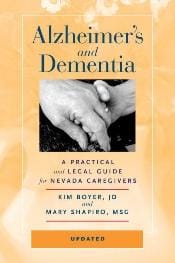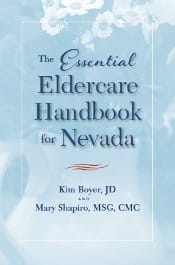Nevada Supreme Court Rules On Surrogate Consent
By Kim Boyer
Avis Maxey, who was 72 years old, ingested approximately 200 prescription pills in an apparent suicide attempt. Her ex-husband, Theodore, with whom she resided, delayed calling an ambulance because he believed she wanted to kill herself. When the paramedics arrived, they nonetheless attempted to resuscitate Avis. At the hospital, Theodore signed papers listing Avis as a Class III patient, meaning her treatment would be limited to comfort care without prolonging her life. A physician signed the order and later extubated Avis on Theodore’s request.
Avis was given an oxygen mask, but that was removed 10 minutes later “per husband’s request.” Over the next three hours Avis’s respirations decreased. The shift changed and a different physician ordered a morphine drip. Avis died soon thereafter, approximately four hours and twenty minutes after admission to the hospital. Later, the family filed a malpractice action.
For the first time, the Nevada Supreme Court addressed multiple sections of Nevada’s Uniform Act on Rights of the Terminally Ill (the “Act”), codified in NRS 449.535 through 449.690. Estate of Maxey v. Darden, 187 P.3d 144 (Nev. 2008).
The Act provides three methods by which terminally ill patients or their families can legally implement their wishes regarding withholding or withdrawing life-sustaining treatment. First, an individual may execute a declaration directing an attending physician to withhold or withdraw life-sustaining treatment under certain circumstances.
i. This declaration is sometimes referred to as a “living will” and Nevada provides a statutory form.
ii. Second, an individual may execute a declaration designating another person to make decisions on the individual’s behalf regarding withholding or withdrawing life-sustaining treatment. Again, Nevada provides a statutory form, but it is not required to be in that form.
iii. Both types of declarations must be signed by the declarant, or another at the declarant’s direction, and attested by two witnesses. Third, in the absence of either an express declaration or a declaration designating another person to make life-sustaining treatment decisions, surrogate consent may be obtained from certain family members.
iv. Avis had not executed a declaration concerning her end-of-life wishes and had not designated a health care decision-maker. Therefore, the case turned on whether her physician received valid surrogate consent before withholding treatment.
The Act provides three requirements that must be met before there is effective surrogate consent. First, the patient must not already have an effective declaration concerning life-sustaining treatment. Second, the surrogate must consent to the withdrawing or withholding of life-sustaining treatment in writing, attested by two witnesses. Third, the attending physician must determine that the patient is in a terminal condition and is no longer able to make decisions regarding life-sustaining treatment.
The Act specifies which family members may provide surrogate consent, in the following order of priority: (1) the spouse of the patient; (2) an adult child of the patient or, if there is more than one adult child, a majority of the adult children who are reasonably available for consultation; (3) the parents of the patient; (4) an adult sibling of the patient or, if there is more than one adult sibling, a majority of the adult siblings who are reasonably available for consultation; or (5) the nearest other adult relative of the patient by blood or adoption who is reasonably available for consultation. If a class entitled to decide whether to consent is not reasonably available for consultation and competent to decide, or declines to decide, the next class is authorized to decide, but an equal division in a class does not authorize the next class to decide. Although Theodore was the ex-husband and not entitled to give consent under the Act, he presented as husband and the emergency room physician was unable to ascertain his status as ex-husband.
The parties argued whether the emergency room physician was an “attending physician” within the meaning of the statute. The Nevada Supreme Court found that the emergency room physician was the “attending physician,” finding that the Act refers to the physician “who has primary responsibility for the patient’s treatment and care at the time when administering life-sustaining treatment becomes an issue.”
The surrogate must consent to withdrawing or withholding life-sustaining treatment in writing, “attested by two witnesses.” Only the emergency room physician witnessed the consent, and the nurse made chart notes. There was an issue of fact as to whether the chart notes would be considered a proper attestation by a second witness. The Nevada Supreme Court found that, under the statutory provisions regarding surrogate consent, an attesting witness must have personal knowledge that the surrogate gave consent to withholding or withdrawing the terminally ill patient’s life-sustaining treatment. If an attesting witness is present at the time when the surrogate provides written consent, personal knowledge of the surrogate’s intent is presumed. NRS 449.626(1) does not require an attesting witness to subscribe his or her name to the consent form, but instead only requires proof of the attesting witness’s personal knowledge.
Finally, the attending physician must determine that the patient is in a terminal condition and is no longer able to make his or her own decisions regarding administration of life-sustaining treatment. The Act defines “terminal condition” as “an incurable and irreversible condition that, without the administration of life-sustaining treatment, will, in the opinion of the attending physician, result in death within a relatively short time.” The Court found that there was an issue of fact as to whether the physician exercised reasonable care in classifying Avis as terminal.
In conclusion, this case illustrates the need for effective declarations. It is important that declarations be attested by two witnesses. Another tool, not discussed in this case, is the durable power of attorney for health care. A durable power of attorney for health care allows a person (the “principal”) to state his or her choices for health care and to name an agent to make those decisions when the principal is unable to make decisions about his or her own medical treatment. The surrogate consent act is limited only to decisions regarding life-sustaining treatment and is limited to specific family members. In contrast, a durable power of attorney for health care allows the agent to make broader medical pharmacy decisions for the principal, and any person can be named as agent.
i NRS 449.600(1).
ii NRS 449.610 provides as follows: “A declaration directing a physician to withhold or withdraw life-sustaining treatment may, but need not, be in the following form: If I should have an incurable and irreversible condition that, without the administration of life-sustaining treatment, will, in the opinion of my attending physician, cause my death within a relatively short time, and I am no longer able to make decisions regarding my medical treatment, I direct my attending physician, pursuant to NRS 449.535 to 449.690, inclusive, to withhold or withdraw treatment that only prolongs the process of dying and is not necessary for my comfort or to alleviate pain.”
iii NRS 449.613 provides as follows: “A declaration that designates another person to make decisions governing the withholding or withdrawal of life-sustaining treatment may, but need not, be in the following form: If I should have an incurable and irreversible condition that, without the administration of life-sustaining treatment, will, in the opinion of my attending physician, cause my death within a relatively short time, and I am no longer able to make decisions regarding my medical treatment, I appoint …………………………. or, if he or she is not reasonably available or is unwilling to serve, …………………………, to make decisions on my behalf regarding withholding or withdrawal of treatment that only prolongs the process of dying and is not necessary for my comfort or to alleviate pain, pursuant to NRS 449.535 to 449.690, inclusive. (If the person or persons I have so appointed are not reasonably available or are unwilling to serve, I direct my attending physician, pursuant to those sections, to withhold or withdraw treatment that only prolongs the process of dying and is not necessary for my comfort or to alleviate pain.)
Strike language in parentheses if you do not desire it.”
iv NRS 449.626.
v NRS 449.590.





